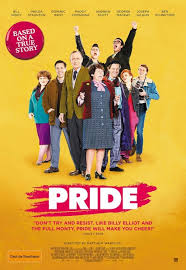 Last night I saw the movie Pride at the Dendy in Newtown. After a tiring day's work all I wanted was some light entertainment, which it did deliver, but this movie was so much more than that. Pride is based on a true story from 1984 England, when Margaret Thatcher is in power and the National Union of Mineworkers is striking. A group of gay and lesbian activists decide to raise money to support the families of the striking miners. The union, embarassed to receive their support, refuses them. Eventually the activists go directly to a mining village in Wales to make their donation in person. I won't spoil the whole plot, but these two communities form an unlikely partnership. As much as this was a light laugh fest, the movie also illustrated some significant points about how we heal ourselves individually and collectively - or not. While the title of the movie was pride, a lot of the movie was also about its flipside. Pride's flipside - shame, was displaced and projected on to the gay and lesbian community and working class alike by the mainstream and the elite. Multiple delicate tipping points in the movie showed individuals and groups making a choice to collapse into seperation, disconnection, and shame, or to connect with each other in pride (or in the union's terms, solidarity.) A number of the activist characters illustrated the destructive potential of shame. In a moment of frustrated defeat the character Gethin breaks the rules of the group by going out collecting donations by himself, and becomes a victim of hate crime. To the degree that shame is accepted and internalised, it will often be re-expressed in risky or self damaging acts. Another character, the firebrand leader Mark, is powerful in his capacity to throw shame back where it belongs, in this case on to mainstream homophobic society. His later death from AIDS illustrates the fragility of aggressive defences against shame. While much good therapeutic work gets done individually, or in groups, how much more might be possible if we could recouple personal and social liberation in the way shown in this film?
0 Comments
Leave a Reply. |
AuthorsMichael Apathy and Selina Clare are practitioners of psychotherapy at Lucid who are excited about fresh, innovative, and effective therapy for individual and environmental change. Categories
All
Archives
December 2016
|
Specialty Areas |
Online BookingBook my first session.
If there are no bookable services showing via the online booking website, this means we currently have a waiting list for new clients. Please give us a call or email if you would like to add your name to it. |
 RSS Feed
RSS Feed